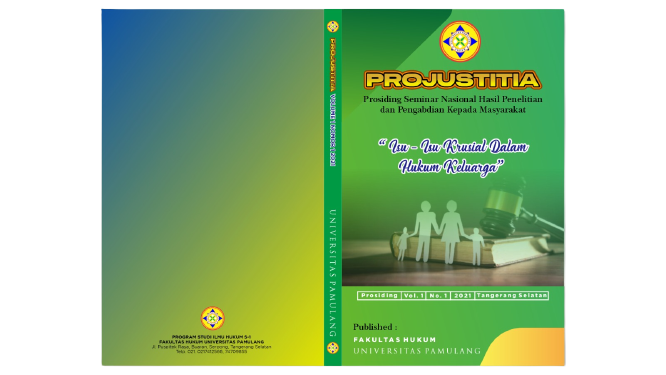TINJAUAN YURIDIS NORMATIF TENTANG PENETAPAN HAK DAN KEWAJIBAN TERHADAP AHLI WARIS (Studi Komparatif Hak dan Kewajiban Ahli Waris Menurut Kompilasi Hukum Islam dan KUH Perdata)
Abstract
ABSTRAK
Hukum waris merupakan bagian terpenting dalam hukum Islam. Al-Qur'an mengatur hukum waris dengan jelas dan terperinci. Yang menjadi masalah adalah apa hak dan kewajiban ahli waris dalam Pasal 1100 KUH Perdata? Bagaimana ditinjau dari hukum Islam? Dalam menyusun jurnal ini menggunakan penelitian kepustakaan dengan menggunakan pendekatan yuridis normatif, yang secara deduktif dimulai analisa terhadap pasal 1100 KUH Perdata tentang hak dan kewajiban ahli waris pada saat terbukanya warisan. Hasil pembahasan ini menunjukkan Pasal 1100 tentang konsekuensi ahli waris yang menerima warisan, Pasal 1024 tentang tenggang waktu berpikir bagi ahli waris dalam menentukan sikap yaitu apakah akan menerima warisan atau menolak. Apabila ia menentukan sikap menerima maka menurut Pasal 1044 KUH Perdata seluruh harta peninggalan harus dicatat pada balai harta peninggalan. Apabila ia menolak maka ahli waris tersebut menurut Pasal 1057 KUH Perdata harus mendaftarkan di kepaniteraan Pengadilan Negeri. Kesimpulan nya, jika dibandingkan persamaan antara KUH Perdata dan Hukum Islam maka kedua nya meletakkan hak dan kewajiban sama-sama kepada ahli waris. Dalam hukum Islam yang diterima ahli waris adalah harta warisan bersih setelah dikurangi segala beban. Sedangkan dalam perspektif KUH Perdata bahwa harta peninggalan yang diterima ahli waris adalah seluruh harta warisan kotor yaitu berikut beban yang harus dipikul ahli waris.
Kata Kunci : ahli waris; hukum waris; warisan
ABSTRACT
Inheritance law is the most important part of Islamic law. Al-Qur'an regulates inheritance law clearly and in detail. The problem is what are the rights and obligations of the heirs in Article 1100 of the Civil Code? What if viewed from Islamic law? In the preparation of this journal using library research using a normative juridical approach, which deductively begins with an analysis of article 1100 of the Civil Code concerning the rights and obligations of heirs at the time of inheritance. The results of this discussion indicate that Article 1100 concerning the consequences of heirs who receive an inheritance, Article 1024 concerning the grace period for thinking for the heirs in determining their attitude, namely accepting or rejecting the inheritance. If he decides to accept, then according to Article 1044 of the Civil Code, all inherited assets must be recorded at the inheritance hall. If he refuses, the heir according to Article 1057 of the Civil Code must register at the Registrar's Office of the District Court. In conclusion, if we compare the similarities between the Civil Code and Islamic Law, both place the same rights and obligations on the heirs. In Islamic law, the heirs receive a net inheritance after deducting all expenses. Meanwhile, according to the Civil Code that the inheritance received by the heirs is the entire inheritance, namely the following burdens that must be borne by the heirs.
Keyword : heir; inheritance law; legacy


